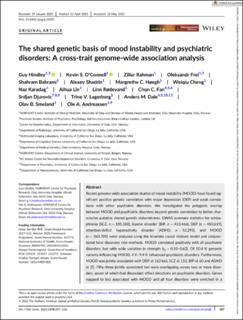| dc.contributor.author | Hindley, Guy Frederick Lanyon | |
| dc.contributor.author | O'Connell, Kevin Sean | |
| dc.contributor.author | Rahman, Zillur | |
| dc.contributor.author | Frei, Oleksandr | |
| dc.contributor.author | Bahrami, Shahram | |
| dc.contributor.author | Shadrin, Alexey | |
| dc.contributor.author | Høegh, Margrethe Collier | |
| dc.contributor.author | Cheng, Weiqiu | |
| dc.contributor.author | Karadag, Naz | |
| dc.contributor.author | Lin, Aihua | |
| dc.contributor.author | Rødevand, Linn | |
| dc.contributor.author | Fan, Chun C. | |
| dc.contributor.author | Djurovic, Srdjan | |
| dc.contributor.author | Lagerberg, Trine Vik | |
| dc.contributor.author | Dale, Anders | |
| dc.contributor.author | Smeland, Olav Bjerkehagen | |
| dc.contributor.author | Andreassen, Ole | |
| dc.date.accessioned | 2022-12-21T08:28:57Z | |
| dc.date.available | 2022-12-21T08:28:57Z | |
| dc.date.created | 2022-10-05T10:42:07Z | |
| dc.date.issued | 2022 | |
| dc.identifier.issn | 1552-4841 | |
| dc.identifier.uri | https://hdl.handle.net/11250/3038952 | |
| dc.description.abstract | Recent genome-wide association studies of mood instability (MOOD) have found significant positive genetic correlation with major depression (DEP) and weak correlations with other psychiatric disorders. We investigated the polygenic overlap between MOOD and psychiatric disorders beyond genetic correlation to better characterize putative shared genetic determinants. GWAS summary statistics for schizophrenia (SCZ, n = 105,318), bipolar disorder (BIP, n = 413,466), DEP (n = 450,619), attention-deficit hyperactivity disorder (ADHD, n = 53,293), and MOOD (n = 363,705) were analyzed using the bivariate causal mixture model and conjunctional false discovery rate methods. MOOD correlated positively with all psychiatric disorders, but with wide variation in strength (rg = 0.10–0.62). Of 10.4 K genomic variants influencing MOOD, 4 K–9.4 K influenced psychiatric disorders. Furthermore, MOOD was jointly associated with DEP at 163 loci, SCZ at 110, BIP at 60 and ADHD at 25. Fifty-three jointly associated loci were overlapping across two or more disorders, seven of which had discordant effect directions on psychiatric disorders. Genes mapped to loci associated with MOOD and all four disorders were enriched in a single gene-set, “synapse organization.” The extensive polygenic overlap indicates shared molecular underpinnings across MOOD and psychiatric disorders. However, distinct patterns of genetic correlation and effect directions may relate to differences in the core clinical features of each disorder. | en_US |
| dc.language.iso | eng | en_US |
| dc.publisher | Wiley | en_US |
| dc.rights | Navngivelse 4.0 Internasjonal | * |
| dc.rights.uri | http://creativecommons.org/licenses/by/4.0/deed.no | * |
| dc.title | The shared genetic basis of mood instability and psychiatric disorders: A cross-trait genome-wide association analysis | en_US |
| dc.type | Journal article | en_US |
| dc.type | Peer reviewed | en_US |
| dc.description.version | publishedVersion | en_US |
| dc.rights.holder | Copyright 2022 the authors | en_US |
| cristin.ispublished | true | |
| cristin.fulltext | original | |
| cristin.qualitycode | 1 | |
| dc.identifier.doi | 10.1002/ajmg.b.32907 | |
| dc.identifier.cristin | 2058693 | |
| dc.source.journal | American Journal of Medical Genetics Part B: Neuropsychiatric Genetics | en_US |
| dc.source.pagenumber | 207-218 | en_US |
| dc.identifier.citation | American Journal of Medical Genetics Part B: Neuropsychiatric Genetics. 2022, 189 (6), 207-218. | en_US |
| dc.source.volume | 189 | en_US |
| dc.source.issue | 6 | en_US |

